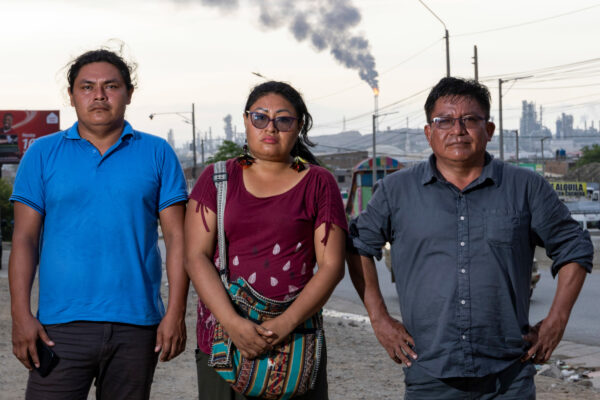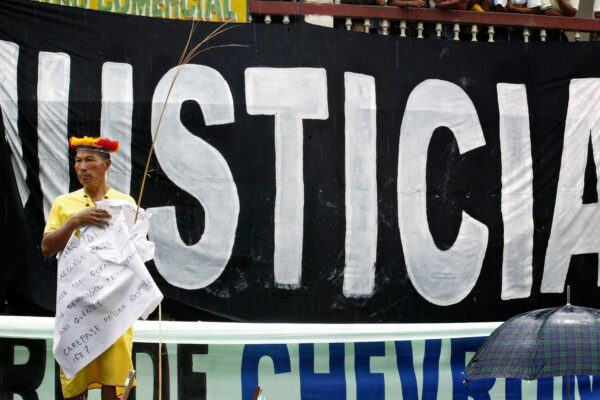Over the last decade, the Peruvian government has pursued an aggressive hydrocarbon development plan and concessioned off nearly 70% of the Peruvian Amazon to international oil companies without consulting with affected indigenous peoples. This strategy presents serious threats to the environment and indigenous rights and has already resulted in massive protests. The underlying social unrest and lack of social license to operate creates major operational, reputational and legal risks for companies.
Despite a finding by Peru’s constitutional court that the government’s consultation process was legally inadequate, the oil and gas leasing arm of the Peruvian government, Perupetro, recently leased fourteen new oil blocks in the Amazon. Indigenous organizations, human rights experts, and international bodies have all expressed concern. In February 2010, the UN International Labor Organization (ILO) recommended that the Peruvian government “suspend the exploration and exploitation of natural resources which are affecting [indigenous peoples]” until the government has implemented effective consultation mechanisms. Although indigenous peoples worked with the government to draft a consultation law that Congress approved last spring, Peru’s president Garcia refused to sign the law and has ignored calls by the national Amazonian indigenous federation, AIDESEP, for a moratorium on new oil concessions until the consultation law is in place.
In its rush to sell off the Amazon, the Peruvian government has ignored the underlying causes of social conflict. The Peruvian government’s failure to consult with affected indigenous peoples about development projects has already had serious consequences, most notably in the Amazon-wide protests leading to the tragic violence in Bagua in June 2009. The growing resistance of indigenous peoples to oil operations has also generated conflicts that have cost oil companies millions of dollars in recent years. Similarly, the lack of social license to operate is creating reputational problems for companies, such as Talisman Energy, whose operations in northern Peru are strongly opposed by the Achuar people.
Peru is opening some of the most remote regions of the Amazon to oil drilling, threatening some of the most biodiverse forests on the planet and the lives of the indigenous peoples who depend on this forest for their livelihoods. The disaster in the Gulf of Mexico is a clear demonstration of the risks involved; like deep sea oil drilling, operations in the Amazon also push the boundaries of technology in a fragile environment. Experts recognize that an oil spill in the Amazon would create an ecological disaster.
Investors should continue to monitor this situation, as the companies investing in Peruvian hydrocarbon concessions face significant reputational and legal risks as a result of these problems.
The New Concessions
Of the 25 new concessions announced by Peru last year, Perupetro awarded fourteen – all located in the Amazon – in October 2010. Four lots went to a consortium including the Colombian oil company Ecopetrol and Spain’s Repsol YPF; all four lots are located in the Amazon, primarily in the Huallaga and Ucayali river basins. Ecopetrol won another concession in the Marañon river basin, near an area that recently suffered a major oil spill caused by Argentine oil company Pluspetrol, with devastating effects for the indigenous peoples of that area. The other concessions were awarded to Argentina’s Tecpetrol, Ireland’s Hydrocarbon Exploration, and the Peruvian subsidiary of China’s Sinochem, Emerald Energy Peru. These new lots all represent serious threats to the sustainability of the Peruvian Amazon and the human rights of indigenous peoples whose territories lie within the blocks.
| Lot Number | River Basin | Company Awarded |
| 176 | Ucayali | Consortium: Repsol Exploración Perú, YPF, and Ecopetrol del Perú |
| 180 | Huallaga | Consortium: Repsol Exploración Perú, YPF, and Ecopetrol del Perú |
| 182 | Huallaga | Consortium: Repsol Exploración Perú, YPF, and Ecopetrol del Perú |
| 184 | Huallaga | Consortium: Repsol Exploración Perú, YPF, and Ecopetrol del Perú |
| 165 | Marañon | Emerald Energy (Sinochem subsidiary) |
| 173 | Ucayali | Emerald Energy (Sinochem subsidiary) |
| 175 | Ucayali | Emerald Energy (Sinochem subsidiary) |
| 178 | Marañon | Emerald Energy (Sinochem subsidiary) |
| 185 | Marañon | Emerald Energy (Sinochem subsidiary) |
| 183 | Marañon | Hydrocarbon Exploration |
| 188 | Ucayali | Hydrocarbon Exploration |
| 179 | Marañon | Ecopetrol del Perú |
| 174 | Ucayali | Tecpetrol Internacional |
| XXVIII | Sechura | Pitkin Petroleum |
Failure to Consult and Indigenous Opposition
Indigenous peoples have raised serious concerns about the Peruvian government’s continuing refusal to heed their calls to implement a consultation law and recognize indigenous territories before imposing new concessions over their lands. Peru’s constitutional court recently indicated that the Peruvian government violates international and domestic law when it acts without the consent of affected indigenous peoples and that the consultation process carried out by the Ministry of Energy and Mines does not satisfy this requirement. Human rights experts warn that social conflict may worsen as indigenous peoples reject new hydrocarbon activities authorized without their consent. The companies that have won these concessions face major reputational and legal risks if they begin working in these areas without first engaging in a process to determine whether the affected peoples are willing to grant their free, prior and informed consent to such operations.
These risks are exacerbated by the fact that the government refuses to grant legal title to many indigenous territories despite its international legal obligation to do so. Companies may not realize that the government has imposed an oil block over indigenous lands, because it appears that the government is offering supposedly empty areas of forest when the reality is that indigenous peoples live, hunt and fish in these areas. In the case of indigenous peoples living in voluntary isolation, the risks of corporate involvement in human rights violations is even greater. Isolated peoples are extremely sensitive to health impacts and forced displacement, and companies should not operate in areas occupied by them. The Peruvian government claims that the new blocks do not pose any risk to isolated peoples, which leaves companies dangerously unaware that some concessions may overlap areas occupied by isolated peoples.
Indigenous organizations in Peru are strongly opposed to the creation and award of new oil concessions without proper consultation. Companies entering into this environment face an uphill battle in acquiring any social license to operate, in addition to legal and reputational risks. Consultation is not only a legal requirement and a fundamental right of indigenous peoples, but also a process to assure the social legitimacy of any actions that might affect their territory. Peru’s failure to engage in this process in a meaningful way creates a serious risk of increased social conflict as indigenous peoples attempt to defend their lives and territories. Given these risks and the strong critique from indigenous federations, human rights groups, and international organizations, Peru should follow the International Labor Organization’s suggestion that all new concessions be suspended until a legally adequate consultation process is in place.
The Peruvian government has imposed these new oil and gas concessions on indigenous lands despite the fact that doing so represents a violation of indigenous peoples’ rights and increases the possibility of social conflict. Companies that choose to operate in this environment face serious legal and reputational risks and may lose the concessions or find themselves complicit in human rights violations.
Opportunities for Involvement
For more information on Amazon Watch’s shareholder advocacy work in Peru, please contact Britton Schwartz, Peru Advocate, at britton@amazonwatch.org. If you are interested in joining an active shareowner engagement with Repsol YPF regarding indigenous peoples’ rights, particularly regarding its operations in the Amazon and Peru, please contact Steven Heim, Boston Common Asset Management, at sheim@bostoncommonasset.com.













